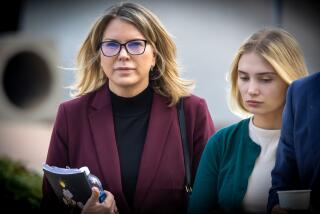Private Hearing Sought for Noelle Bush
- Share via
ORLANDO, Fla. — An attorney for Gov. Jeb Bush’s daughter asked a judge Tuesday to close her drug court proceedings, arguing that she has a right to privacy while under that court’s supervision.
Drug courts help a person complete treatment and aren’t subject to the same openness as criminal courts, lawyer Peter Antonacci argued.
However, an attorney for the Orlando Sentinel and the South Florida Sun-Sentinel newspapers said drug courts are no different than any other criminal court and should stay open.
“This decides whether she goes to jail or not,” said Jonathan Kaney, an attorney who specializes in 1st Amendment issues. He said there is no “celebrity exception to the rule of openness in court.”
The judge didn’t say when he would make a decision.
Noelle Bush, 25, was arrested in January for allegedly buying an anti-anxiety drug with a fraudulent prescription. She sought treatment through a drug court, but she could face criminal charges if she fails to complete the treatment.
In July, she spent two days in jail for allegedly possessing a prescription drug.
Last month, police were called to her treatment center in Orlando after another patient said Bush had crack cocaine.
Speaking to reporters in Tallahassee, the governor said drug courts should be protected from public scrutiny.
“At a point in time, people can be looked at as though they’re failing when in fact if you look at it over the long haul, they’re on the road to recovery,” he said.
Carolyn Cooper, associate director of the Drug Court Clearinghouse at American University in Washington, said she had never heard of a drug court hearing being closed to the public. Neither had Karen Freeman-Wilson, chief executive of the National Assn. of Drug Court Professionals in Washington.
If the judge rules in favor of Noelle Bush, it would go against the grain of the 1st Amendment, because court proceedings are closed to the public only under rare circumstances, said Bruce J. Winick, a law professor at the University of Miami.
“Our tradition is one of openness,” he said. “What happens in a courtroom is of strong public interest.”
More to Read
Sign up for Essential California
The most important California stories and recommendations in your inbox every morning.
You may occasionally receive promotional content from the Los Angeles Times.













